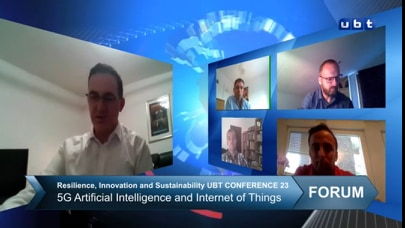
UBT held a conference on the topic: “5G Artificial Intelligence and Internet of Things”
31/05/2020The Internet largely influences on every human life today, and without it, life would be difficult and impossible. However, the topic of discussion in recent months, especially in this time of pandemics, has been the facilitation, but also the impact of 5G waves on both technology developments, digital transformations which facilitate at a large scale people’s life.
Nevertheless to address this issue professionally, UBT organized a video conference on “5G Artificial Intelligence and the Internet of Things.” The opening session of this conference was carried out by the Rector of UBT, prof. Dr. Edmond Hajrizi, whereas the other participants were mainly experts and UBT staff from the field of science and technology.
Among others expert from the field of science and technology who is at the same time a lecturer at UBT, respectively Xhafer Krasniqi stressed that the pandemic situation has worried the development of 5G networks as a result of the need for faster, smarter and more advanced technology.
“Without Artificial Intelligence and the Internet of Things, 5G would not be complete with the provision of digital services and market demands. These three components are undivided from each other. Due to the fact, Artificial Intelligence may teach us many things quite rapidly, only if there is a transport network, in this case 5G, which enables the transmission of this information or data on the Internet of Thing or technological equipment “, put it Krasniqi .
Meanwhile, Professor Krasniqi stressed that the development of standards for 5G began 4 years ago, but according to him the development of standards for a major function requires more time, somewhere 10 years. So he announced that we are currently in the second phase of development of standards for 5G, while its implementation is expected to begin in late 2020 or early 2021.
In this regard, professor Gilbert Tafa, for 5G, emphasized that as technology tends to unify in the form of a framework all existing technologies, this is because there will be greater speed and very small delays.
“With 5G technology, the speed will be achieved in real time, very small delays and the high intensity of connections of equipment with nearly 1 million devices per square kilometer,” claimed Tafa. While talking about the role and function of Artificial Intelligence, Professor Bertan Karahoda, underscored that Artificial Intelligence, in addition to enabling us to use it in the field of teaching, training or gaining various knowledge, makes it possible to conceive with other technological devices through 5G which help collect data, improve systems and algorithms. Furthermore, professor Besnik Qehaja, stated that the communication and quality of services in 5G, has a great impact on the quality of services in the internal networks of each country.
“In Kosovo and in every country that claims to operate 5G, there should be fiber optic networks. Besides that, “Kosovo after the war has a very good potential as it has invested a lot in a modern infrastructure with these networks thanks to many ISPs, who have created the opportunity for the implementation of 5G in our country as well,” noted Qehaja.
Meanwhile, professor Qehaja announced that in collaboration with the students of the Faculty of Computer Science and Engineering, in the coming days they will unfold the latest project, Smart City, which they have stimulated through the Internet of Things.
Moreover, the online conference was supported by UBT’s Media Group, as it was broadcast live on UBT Television, Radio Campus 100.7 FM, as well as on official Facebook, Instagram and Youtube platforms.